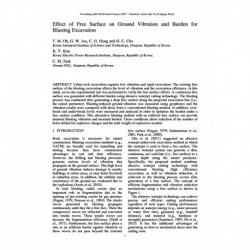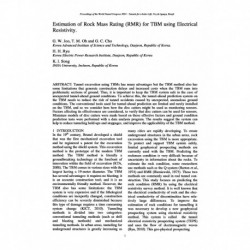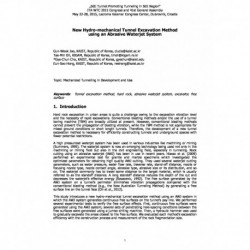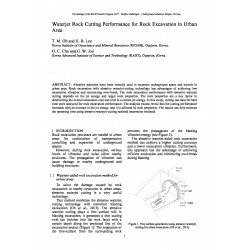No document
Search & filter
Search for a publication
Search & filter
List of products by author: G. W. Joo
-
Effect of Free Surface on Ground Vibration and Burden for Blasting Excavation
Abstract: Urban rock excavation requires low vibration and rapid excavation. The existing free surface of the blasting excavation affects the level of vibration and the excavation efficiency. In this study, an in-situ experimental test was performed to verify the free surface effects. A continuous free surface was generated with different burden using abrasive waterjet cutting technology. The blasting...
0,00 € -
Estimation of Rock Mass Rating (RMR) for TBM using Electrical Resistivity
Abstract: Tunnel excavation using TBMs has many advantages but the TBM method also has some limitations that generate construction delays and increased costs when the TBM runs into problematic sections of ground. Thus, it is important to keep the TBM system safe in the case of unexpected tunnel-ahead ground conditions. To achieve this, the tunnel-ahead prediction system on the TBM needs to reduce the...
0,00 € -
New Hydro-mechanical Tunnel Excavation Method using an Abrasive Waterjet System
Abstract: Hard rock excavation in urban areas is quite a challenge owing to the excavation vibration level and the necessity of rapid excavations. Conventional blasting methods and/or the use of a tunnel boring machine (TBM) are broadly utilized at present. However, conventional blasting methods cannot prevent the propagation of blasting vibration, while the TBM method is not appropriate for mixed ground...
0,00 € -
Waterjet Rock Cutting Performance for Rock Excavation in Urban Area
Abstract: Abrasive waterjets have been recently used to excavate underground space and tunnels in urban area. Rock excavation with abrasive waterjet-cutting technology has advantages of achieving low excavation vibration and minimizing over-break. The rock excavation performance with abrasive waterjet cutting depends on the jet energy and target rock properties. The rock properties are a key factor in...
0,00 €




